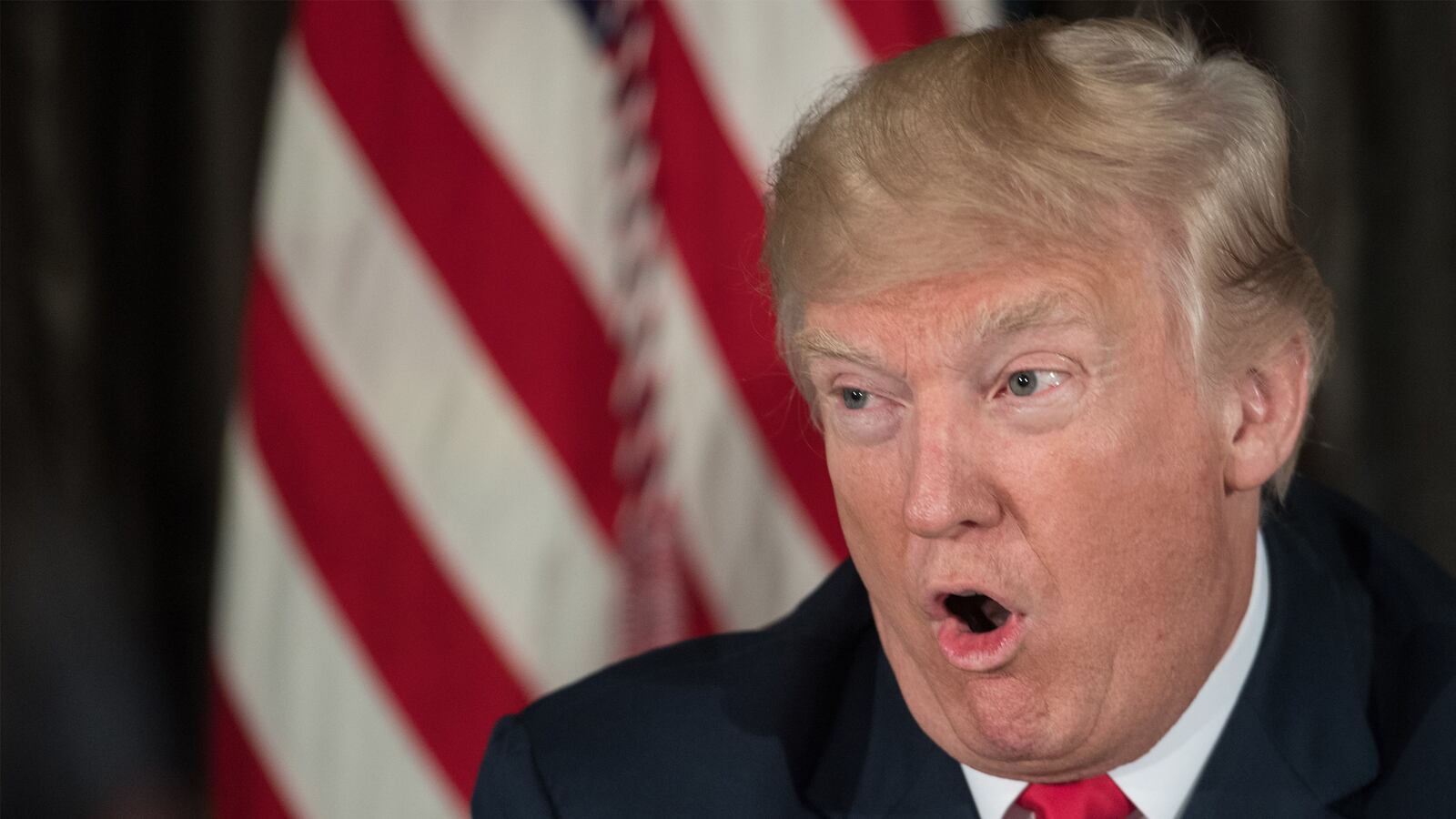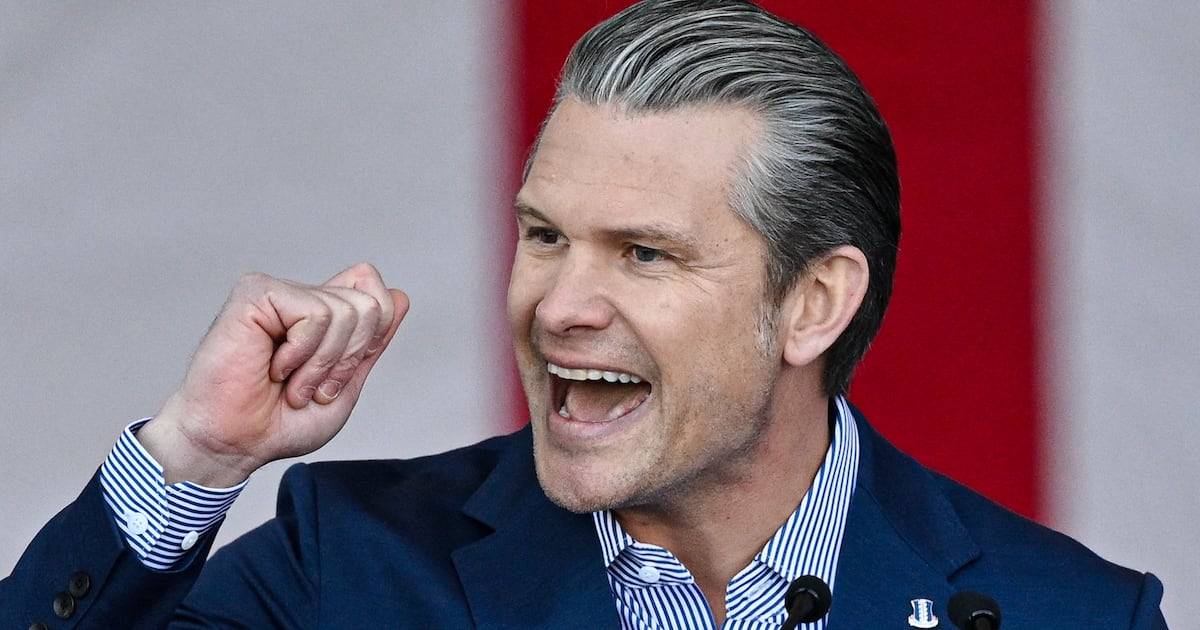President Donald Trump sat with his arms crossed, flanked by the First Lady and the Secretary of the Department of Health and Human Services. In front of him was a bottle of water, an empty glass, a placard and a piece of paper, from which he read—and repeated for emphasis—what appeared to be a pre-written line: North Korea “will be met with fire and fury like the world has never seen” if the regime continued to threaten a nuclear strike against the United States.
But that line, like the rest of his statement, wasn’t massaged by top officials and advisers ahead of time. The president was ad-libbing his way to a potential nuclear standoff not even seven months into his first term.
Three White House officials told The Daily Beast that Trump’s threats against North Korea and its leader, Kim Jong Un, were off-the-cuff. The president had been briefed on Pyongyang’s newest round of threats, as well as intelligence suggesting North Korea is now capable of equipping intercontinental ballistic missiles with nuclear warheads. But no one, not even top military officials, expected him to publicly blurt out such a forceful, apocalyptic-sounding statement on the nuke-armed enemy.
It was a sentiment that Trump has shared privately with top White House staffers, some of whom told The Daily Beast that he has used language that reflected the “fire and fury” bluster in sporadic fits of venting about a North Korean regime that his administration has sought, unsuccessfully so far, to rein in through diplomatic channels.
The North Korea crisis has laid bare divisions within the Trump administration, as has other major foreign policy debates such as the war in Afghanistan. Whereas Trump’s top military and national-security brass have often favored a tougher stance, senior aides, including White House chief strategist Steve Bannon, have urged a more restrained approach to North Korea. Internally, Bannon has advised that it would be reckless, a waste of resources, and “dumb” to risk overreacting to North Korean provocations, a senior Trump administration official recounted to The Daily Beast.
Trump’s “fire and fury” remarks went in the opposite direction. And as soon as they were broadcast on Tuesday, other senior aides and comms staff were forced to adjust quickly, some from Bedminster others at the White House. Aides coalesced around some easy spin: The president has always been “very clear about” how he would "act decisively” and "from a position of strength,” according to White House sources familiar with the comms strategy. The president, via the White House’s official insistence, was not threatening nuclear holocaust.
"The DPRK must choose to stop isolating itself and stand down its pursuit of nuclear weapons. The DPRK should cease any consideration of actions that would lead to the end of its regime and the destruction of its people," U.S. Secretary of Defense James Mattis said in a statement Wednesday afternoon. Mattis also emphasized that the "regime's actions will continue to be grossly overmatched by ours and would lose any arms race or conflict it initiates.”
“Donald Trump has no higher priority than the safety and security of the American people,” Vice President Mike Pence gently added, via his official Twitter account.
On the other hand, Sebastian Gorka, the pugilistic White House aide who Trump particularly enjoys seeing on TV, was “sent out on TV to rep the [administration’s] id” this week, as one White House adviser described it.
"He's saying, ‘Don't test America, and don't test Donald J. Trump,'" Gorka declared to Fox News Wednesday morning. "We are not just a superpower. We were a superpower. We are now a hyper-power."
While Gorka was playing up Trump’s machismo on the president’s preferred cable news network, others in the administration were trying to temper tensions.
The Trump administration’s top diplomat, U.S. Secretary of State Rex Tillerson, was one of the people offering a more moderate tone on the North Korea situation, stressing that there was no imminent threat to the United States and stating that Trump had “just wanted to be clear to the North Korean regime on the U.S. unquestionable ability to defend itself.”
But in a reflection of how frantic the internal response was to Trump’s comments, a State Department official tells The Daily Beast that it is highly unlikely that Tillerson knew in advance that the president was going to speak in the terms that he did. Come the next morning, the Secretary was “‘interpreting’ his words to minimize damage as much as possible.”
Even had Tillerson been privy to Trump’s plan to ratchet up the rhetoric, there is only so much that he could have done to manage the fallout. The State Department currently has no permanent ambassador to South Korea, no permanent secretary of East Asian and Pacific Affairs, and no permanent secretary for the Bureau of International Security and Nonproliferation
The role of undersecretary for arms control and international security is vacant.
“[It] would help to have the USG fully staffed so the principals meeting in Washington had the benefit of their experience and expertise in making policy,” said Richard Haass, the President of the Council on Foreign Relations, who served as Director of Policy Planning for the U.S. State Department during the early George W. Bush years. “And [it] would be useful to have senior people in the field heading embassies because they would have access to senior levels of host governments (South Korea, Japan, etc) and thus be able to report U.S. thinking authoritatively to them, be in a position to influence theirs, and feed local thinking back to US decision makers in Washington. In short, this is the diplomatic equivalent of playing the World Series without several of your starters.”
Though some White House officials were taken aback at the president’s “fire and fury,” others defended the sentiment. “I don’t think anyone expected him to come out and say it, but we liked what he said,” one West Wing official told The Daily Beast. “It’s the kind of tough talk that Americans want to see from their POTUS.”
Those questioning the wisdom of the statement, the official added, “probably want another 20 years of finger wagging. How’s that working out?” Like other Trump officials, they spoke on condition of anonymity because they were not authorized to discuss internal deliberations on the North Korea situation.
Ironically, somebody who would have likely stood for less of this kind of tough talk was Trump himself, when he tweeted in August 2013 a simple warning: “Be prepared, there is a small chance that our horrendous leadership could unknowingly lead us into World War III.”








